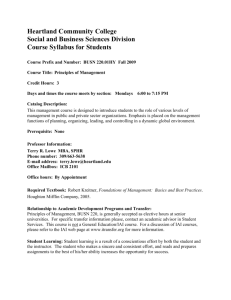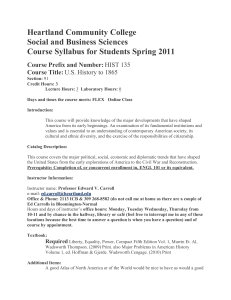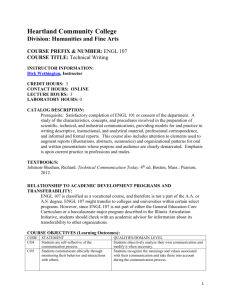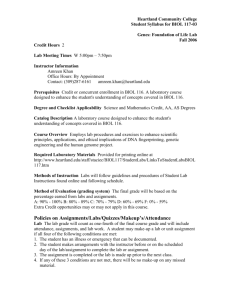ART 150-04 Scott-Dockery syllabus spring 2012
advertisement
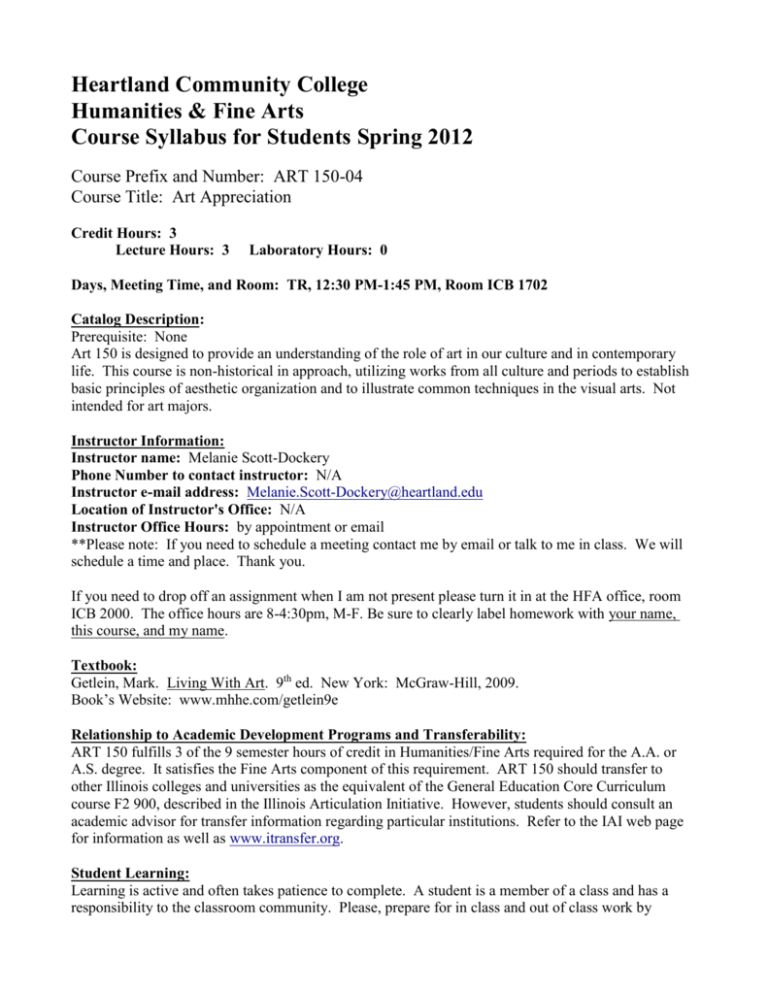
Heartland Community College Humanities & Fine Arts Course Syllabus for Students Spring 2012 Course Prefix and Number: ART 150-04 Course Title: Art Appreciation Credit Hours: 3 Lecture Hours: 3 Laboratory Hours: 0 Days, Meeting Time, and Room: TR, 12:30 PM-1:45 PM, Room ICB 1702 Catalog Description: Prerequisite: None Art 150 is designed to provide an understanding of the role of art in our culture and in contemporary life. This course is non-historical in approach, utilizing works from all culture and periods to establish basic principles of aesthetic organization and to illustrate common techniques in the visual arts. Not intended for art majors. Instructor Information: Instructor name: Melanie Scott-Dockery Phone Number to contact instructor: N/A Instructor e-mail address: Melanie.Scott-Dockery@heartland.edu Location of Instructor's Office: N/A Instructor Office Hours: by appointment or email **Please note: If you need to schedule a meeting contact me by email or talk to me in class. We will schedule a time and place. Thank you. If you need to drop off an assignment when I am not present please turn it in at the HFA office, room ICB 2000. The office hours are 8-4:30pm, M-F. Be sure to clearly label homework with your name, this course, and my name. Textbook: Getlein, Mark. Living With Art. 9th ed. New York: McGraw-Hill, 2009. Book’s Website: www.mhhe.com/getlein9e Relationship to Academic Development Programs and Transferability: ART 150 fulfills 3 of the 9 semester hours of credit in Humanities/Fine Arts required for the A.A. or A.S. degree. It satisfies the Fine Arts component of this requirement. ART 150 should transfer to other Illinois colleges and universities as the equivalent of the General Education Core Curriculum course F2 900, described in the Illinois Articulation Initiative. However, students should consult an academic advisor for transfer information regarding particular institutions. Refer to the IAI web page for information as well as www.itransfer.org. Student Learning: Learning is active and often takes patience to complete. A student is a member of a class and has a responsibility to the classroom community. Please, prepare for in class and out of class work by completing homework and readings on time. Always bring your textbook, class materials, and keep this syllabus on hand. Plan on spending approximately two hours per week outside of class to prepare and complete work for this course. Most of the homework will be reading in preparation for the next class assignment. Successful students are self-motivated, personally responsible, self-aware, embrace lifelong learning, and believe in themselves. You do not have to tackle this class on your own, ask questions and request assistance when needed. We all need help sometimes. Instructor’s Role: First of all, know that if you have any questions about the class or problems with assignments contact me. This includes difficulty understanding the material as well as tackling the workload. The best way is after class or through email. I check messages at least every other day. If you contact me with a problem I will respond as soon as possible to resolve the issue. I am here to challenge and assist you. To fully challenge you, I will sometimes challenge your assumptions about art, and to assist you I will honestly evaluate your performance. Like students, I am a member of this class and have a responsibility to come prepared and ready to work. We are embarking on the exciting journey of exploring visual art. I am your guide on this tour. Warning: when traveling I sometimes enjoy being lost to discover something new and unexpected. So far I have always found my way home. Course Objectives (Learning Outcomes): Through study during this course, you should learn to: 1. Identify the works of art that are considered to represent the greatest achievements of various cultures and civilizations and that have defined these civilizations' visual traditions (D2). 2. Articulate and communicate major ideas that have informed the principal intellectual and aesthetic movements within the history of the visual arts (C1, P7). 3. Recognize various periods, mediums, and subjects in art. 4. Identify the principal artists, writers, philosophers, and other intellectuals who have made major contributions to the visual arts (D5). 5. Compare non-Western cultural and artistic values to those of the West, recognizing nonWestern adaptations to and influences on Western culture and aesthetics (D3). 6. Articulate both in speech and in writing those personal thoughts and observations that have come about due to class assignments and discussions (i.e. through written artists' statements or during group critiques in the classroom) (C4, C7). 7. Demonstrate awareness, tolerance, and appreciation of the extent and impact of cultural diversity in our society as reflected in the visual arts (D1). 8. Interact with other individuals and in groups to come to a consensus about an aesthetic problem and to solve it (P7). 9. Identify appropriate topics for scholarly research in art appreciation, utilize standard bibliographic and other research tools, select suitable sources and methodology, and write papers presenting the results of your research while observing the conventions of scholarly discourse (C6). Course Outline: I. Introduction A. Living with art B. What is art? C. Themes and purposes of art II. The Vocabulary of Art A. The visual elements B. The principles of design in art III. Two-Dimensional Media A. Drawing B. Painting C. Prints D. The Camera Arts E. Graphic Design IV. Three-Dimensional Media A. Sculpture B. Crafts C. Architecture (structure and function) V. Arts In Time A. The Ancient World B. Christian Art in Europe C. The Renaissance D. The 17th and 18th Centuries E. The Modern World F. Art Since 1945 G. Art Around the World Method of Instruction: Instruction will take the form of class discussions, demonstrations, fieldtrips, individual and smallgroup projects, student research, and lectures. Course Policies: Method of Evaluation (Tests/Exams, Grading System): Student assessment will be based on the scores of a writing requirement, three objective tests, a final exam, a presentation, and quizzes (with additional reading/study questions). The writing will comprise one-quarter of the overall grade; the three tests, one-quarter; the final exam, one-quarter; and the other assignments, one-quarter. 25% 4 Objective Tests 25% Final Exam 25% Research Paper (5 pages minimum) and Rough Draft of Research Paper 25% 3 Gallery Assignments (1-2 pages each), possible Quizzes, Research Presentation, and other class work Grading System: 4 Objective Tests 1 Final Exam 1 Research Paper 1 Rough Draft All other work Total Class Points 200 points (50 each) 200 points 150 points 50 points 200 points 800 points Grading Scale: 92 to 100% = A (736-800 points) 83 to 91% = B (664-735 points) 74 to 82% = C (592-663 points) 65 to 73% = D (520-591 points) Below 65% = F (519 points and below) Objective Tests: Tests are composed of multiple choice, fill-in-the-blank, short answer, and/or short essay. Specifications for Written Assignments: Use MLA (Modern Language Association) formatting. Refer to OWL at Purdue for guidance (http://owl.english.purdue.edu/), pick up a guide at the HCC library, or contact a representative of HCC’s Writing Center. Please ask if you have any questions. Please let your reader (usually me) know from where you retrieve information. If you cite quotes or ideas from any sources, include a works cited page. This includes short and long written assignments. Grammatical errors and misspellings will affect grades so use spell check and proofread. Do not use websites for reference unless the site is created by a professional in the field of art, for example, a museum or artist. Use sources that will give you accurate and good information. The HCC library has a great handout on evaluating sources. Titles of artworks are italicized. Do not use Wikipedia as a source. You can use it as a reference to get started, but you cannot trust the information on Wikipedia because it is user driven. That means those creating the content are not always experts in the field of art and culture. Specifications for Gallery Reviews: These assignments will be comprised of short answer and writing You will receive specific direction before each gallery review is due. For the gallery review, the class will meet at the assigned space. If you cannot meet the class for any reason, contact me as soon as possible. Rough Draft: You will be graded on your research and writing progress on the rough draft. The rough does not have to be a completed paper, but it must be at least 4 pages in length, include source citations, and list the questions you will ask the class about your topic. Some of these questions will be on Test #4. The Research Presentation: Students will be divided in groups according to their research interest. Each student will present the discoveries of their research to the class in a group format. Each group will be guided through discovering connections and comparisons between their subjects for talking points during their group’s presentation. Along with speaking to the class for approximately 5-8 minutes, the student presenter will create a brief 5 question response sheet to distribute to fellow students. The questions should ask for responses to the information presented, not evaluation of the presentation. Lastly, make sure you present examples of the artist’s work during your presentation. Specifications for the Research Paper: Even though some research work is done in a group, each student is responsible for turning in a paper with a focus on one artist. A list of suggested topics is located at the end of the syllabus. The body of the paper must be 5 pages in length. Do not use first person in the research paper. Have a minimum of four sources other than class text that include books and journal articles. You must cite information from these sources, not just list them in your bibliography. You may use websites created by professionals in the field (art museums, galleries, artists, or theorists). Websites created by nonprofessionals in the field of art are not acceptable. Incompletes Policy: If you are struggling or foresee a complication in completing this course contact me as soon as possible. It is best to avoid an incomplete. In the event of an emergency, I will assess whether or not an incomplete would be helpful to your education endeavors. Also, I will only consider granting an incomplete if your work, class participation, and attendance has been good to date. Deadlines and Make-up Work: If you have been a diligent student in class, but a problem arises due to illness or other unforeseen circumstances I reserve the right to negotiate deadlines and make-up assignments with you. This does not guarantee that I will accept make-up work or late assignments. The student must contact me as soon as possible to negotiate the results of the situation. Medical verification or other proof of your need to be absent or have a deadline extended will assist in negotiation of missed or late assignments. Extra Credit: Depending on class progress, I may offer the class an opportunity to earn extra points. I will announce this to the entire class when appropriate. I do not always give extra credit. I use it if it is going to enhance the learning experience. W at Midterm: I reserve the right to withdraw any student not progressing towards completion of the class when midterm grades are recorded. If you have questions about this please ask. Attendance Policy: You should only miss class if absolutely necessary, in the case of an emergency or illness. If you have two absences you are required to meet with me before returning to class. Please show up early when returning. If we do not have time to talk then we will meet after class that day. We will discuss the reasons for your absence, how well you are keeping up with the homework, and whether or not it will be possible for you to complete the course. Please note: If you arrive late or leave early more than once, it will be counted as an absence. Required Writing and Reading: There is approximately 60-80 pages of reading per week for this course. Completing the reading before class is essential to participating in class discussions and projects. One long paper (12-15 pages or equivalent in shorter assignments) presenting the results of students' independent library research is required for this class. Student Conduct: Please display courteous behavior while in class. Do not make noise or talk while someone else is addressing the class. Put your cell phone and/or other electronic devices away when class begins, unless otherwise directed for an assignment. Keep your focus on the topics at hand and use the time in ART 150-04 for work in that class. Arriving late or leaving early is disruptive to the classroom environment so please do not do it (see above for absence policy). A copy of HCC’s Student Code of Conduct from the 2010-12 catalog is copied at the end of this syllabus. If you are disruptive to the learning environment I will ask you to leave the classroom, and you may be counted absent for the day. Notice of Cancelled Class Sessions: Cancelled class sessions, for all HCC classes, will be listed under Cancelled Class Meetings in the A-Z Index and under Academic Information in the Current Students page on the HCC Web site. Go to http://www.heartland.edu/classCancellations/ to learn what classes have been cancelled for that day and the upcoming week. Be sure to check the last column, which might contain a message from the instructor. Also, logging on to myheartland displays cancelled class information. Additional Information about Heartland Community College: Disability Support Services Heartland Community College offers Disability Support Services (DSS) with offices located in the Academic Support Center. DSS ensures that students with disabilities have equal access to the college’s programs, services and activities through the provision of reasonable accommodations as outlined in Section 504 of the Rehabilitation Act and the Americans with Disabilities Act. DSS offers a wide range of services to support students with disabilities, including: assistive technology, document conversion services, personnel, classroom and testing accommodations. Students with a documented disability who wish to discuss academic accommodations can contact disability support services at (309)268-8259. Academic Integrity Academic integrity is a fundamental principle of collegial life at Heartland Community College and is essential to the credibility of the College’s educational programs. Moreover, because grading may be competitive, students who misrepresent their academic work violate the right of their fellow students. The College, therefore, views any act of academic dishonest as a serious offense requiring disciplinary measures, including course failure, suspension, and even expulsion from the College. In addition, an act of academic dishonesty may have unforeseen effects far beyond any officially imposed penalties. Violations of academic integrity include, but are not limited to cheating, aiding or suborning cheating or other acts of academic dishonesty, plagiarism, misrepresentation of data, falsification of academic records or documents and unauthorized access to computerized academic or administrative records or systems. Definitions of these violations may be found in the college catalog. Plagiarism Plagiarism is the presenting of others’ ideas as if they were your own. When you write a paper, create a project, do a presentation or create anything original, it is assumed that all the work, except for that which is attributed to another author or creator, is your own. Plagiarism is considered a serious academic offense and may take the following forms: • Copying word-for-word from another source and not giving that source credit. • Paraphrasing the work of another and not giving that source credit. • Adopting a particularly apt phrase as your own. • Using an image or a copy of an image without crediting its source. • Paraphrasing someone else’s line of thinking in the development of a topic as if it were your own. • Receiving excessive help from a friend or elsewhere, or using another project as if it were your own. [Adapted from the Modern Language Association’s MLA Handbook for Writers of Research Papers. New York: MLA, 1995: 26] Plagiarism, Specifics for ART 150-04: Most cases of plagiarism arise from carelessness or haste. Violators often attempt to excuse themselves by saying that they were not told of the nature of plagiarism. Consider with notification. You must not include either the phrases or ideas of another in your papers without acknowledgment. Please inform your reader from where the information you are using comes. Don’t be afraid of citing sources which are not books. You can cite everything – including pamphlets, maps, cereal boxes, telephone conversations, movies, television shows, interviews, and world-wide web sites. If I discover a case of plagiarism in this class I will take into account the nature of the offense. The student may be asked to redo an assignment, may fail that assignment, or may fail the class depending on the severity of the offense. Take your time and when in doubt cite your source and you will be okay. Philosophy of Grades The Heartland Community College grading philosophy grows out of our vision of educational excellence. This common philosophy provides a framework for each academic division and instructor as they establish their own individual course grading system, evaluation methods, and course policies using the shared general rubrics for letter grades given below. Letter grades serve as a vehicle to promote meaningful evaluation of student achievement, to inform students of academic progress, and, as necessary, to improve student performance, habits, and practices. Using a letter grade as a prerequisite for subsequent courses means we believe that the grade was assigned through a conscious judgment about a student’s readiness to proceed to more advanced study. At Heartland, students’ academic achievement is measured by their mastery of course objectives and content. We challenge students to meet these recognized standards of achievement and we assign grades based on their success in doing so. Simply stated, we believe that the responsibility for academic achievement rests with the student and that holding students responsible for their learning promotes their academic growth. Letter Grade Rubrics “A” This grade represents consistently outstanding performance that demonstrates superior understanding and skillful use of important course concepts. Performance at this level signifies that the student is extremely well prepared to continue with more advanced study of the subject. “B” This grade represents performance significantly beyond the level necessary to achieve the course objectives. Work is of high quality but not consistently at an outstanding level. Performance at this level signifies that the student is well prepared to continue with more advanced study of the subject. “C” This grade represents an acceptable achievement of the course objectives. Performance at this level signifies that the student is reasonably well prepared to continue with more advanced study of the subject. “D” This grade represents less than adequate performance. It signifies questionable readiness to proceed with more advanced study of the subject. “F” This grade reflects unacceptable performance. The student is not yet ready to proceed with more advanced study of the subject, and must repeat the course successfully to receive credit. Syllabi disclaimer: If the need arises, because of College closings; severe weather; class progress, or other unforeseen circumstances changes may be made to this syllabus and/or course calendar. The class will be notified of changes at the earliest possible time. Course Calendar: This schedule is tentative and subject to class progress. Also, please add notes about assignments due as the class progresses. Because of class progress some assignments may change. Students will be notified of this at the earliest possible time. Week Dates Reading and homework due at the Topics beginning of class 1 1/17 Syllabus (during class) Introduction Day 1/19 2 3 4 5 6 7 8 3/13 9 10 11 12 13 14 1/24 1/26 1/31 2/2 2/7 2/9 2/14 2/16 2/21 2/23 Nat. Geo. & NY Times Article and study guide Ch. 14 and study guide Ch. 1 and study guide Ch. 2 and study guide Ch. 3 and study guide Review and Research Study for Test #1 Ch. 4 and study guide Ch. 5 and study guide Type Gallery Visit Assignment 2/28 3/1 3/6 3/8 3/15 3/20 3/22 3/27 Ch. 6 and study guide Ch. 7 and study guide Review and Research Study for Test #2 Spring Break Ch. 11 and study guide 3/29 4/3 4/5 4/10 4/12 4/17 4/19 Ch. 8 and study guide Ch. 9 and study guide Ch. 13 and study guide Review and Research Study for Test #3 Review and Research Special Topics and Projects 4/24 4/26 Special Topics and Projects 15 5/1 5/3 16 5/8 5/10 5/15 Study for Test #4 Semester Review 12:00pm-1:50pm How Art Made the World – The Day Pictures Were Born Ancient Mediterranean Worlds Living with Art What Is Art? Themes of Art Review and Research Test #1 Visual Elements MCAC visit (John Cassidy…) Principles of Design VE and PD Gallery Assignment due Drawing Painting Review and Research Test #2 Sculpture and Installation IL Wesleyan Galleries (Carol Hahn) Ch. 11 Continued Gallery Assignment due Print Camera and Computer Arts Architecture Review and Research Test #3 Review and Research Special Topics and Projects Draft of Research Paper due ISU Visit (Takashi Moro) Special Topics and Projects Gallery Assignment due Presentations Presentations Research Papers due Test #4 Semester Review Final Exam Research Paper Topics by Group (I am open to other suggestions): Ancient Architecture Renaissance Art Japanese Art Post-Impressionism Photorealism Native American Art Fluxus Harlem Renaissance German Expressionism … Code of Conduct Heartland Community College recognizes its students as both citizens and members of the academic community. As citizens, students have freedom of speech, assembly, association and press and the rights of petition and due process as guaranteed by the state and federal constitutions. As members of the academic community, students have the right and responsibility to participate in formulating and reviewing all College regulations and policies directly affecting them. Upon enrolling at HCC, each student assumes an obligation to act in accordance with generally acceptable standards of responsible adult behavior, which include respect of other students and other members of the College community. If this obligation is neglected or ignored, the College must take appropriate disciplinary action in order to function effectively. Upon committing or attempting to commit any act of misconduct on the College campus, whether in class, at an activity, function or event sponsored or supervised by the College, or elsewhere with a direct relationship between such act and the College, a student may be subject to disciplinary action. Acts of misconduct include, but are not limited to: 1. Academic dishonesty, such as cheating, plagiarism, etc.; 2. Knowingly furnishing false information to the College; 3. Forgery, alteration or any misuse of College documents and records; 4. Conduct which significantly interferes with the College’s teaching, administration or other responsibilities; 5. Conduct which endangers the health, safety or well-being of members of the College community or visitors to the campus, including but not limited to, unauthorized and/or illegal possession, use or distribution of controlled substances, look-alike drugs, alcohol or unauthorized/illegal use or possession of firearms or any other weapon; 6. Violation of specific College rules and regulations, including those regarding campus parking, equipment, facilities and telecommunications/Internet; 7. Failure to comply with directions of College officials acting within the scope of their duties; 8. Any conduct which constitutes a violation of a federal, state or local law. College officials will cooperate with federal, state and local authorities in any investigation of such violations. Students remain subject to federal, state and local laws; violation of these laws may lead to prosecution by agencies or persons, in addition to disciplinary action of the College.
